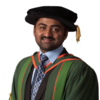
Jaykanth Kankanala
- Course: Medicinal Chemistry PhD
What was your PhD about?
My PhD was about contributing to research that may ultimately produce a cure for cancer of the bladder, and my thesis details how I designed small molecule ‘leads’ that may help prevent bladder cancer in the future. In my project, we applied some medicinal chemistry approaches involving computational chemistry to ‘design’ our molecules. We then developed methods to make ‘real’ version of these molecules in the lab and then we tested them in cancer cells in order to see if they had a beneficial effect- then the cycle of design- make-test continues so as to produce improved molecules. So I hope that my effort may help us to understand ho we can develop future medicines to combat the problem of bladder cancer.
What is it that makes you passionate about that particular area of research?
Well I come from India and I see a lot of people suffering from cancer, in the developed countries as well as the developing countries. Back home, I developed a passion to work on something to do with cancer- Colin Fishwick’s group was the perfect group to start with.
And how did you get to hear about Prof Fishwick and the PhD opportunity?
I was looking for a drug discovery related PhD opportunity and I found that Colin was leading research efforts involving both computational and med chem. So it’s good to be a part of both of these things.
So did you go straight from your undergraduate studies into your PhD?
Actually I did my Masters back home in India and then I worked for a pharmaceutical company for one year and then I decided to come and do a PhD.
Was it your first time living in the UK?
Yes it was and it was all a new culture for me. It was a bit like a cultural shock as it is so different to what we have in India but now four years on I am very settled here.
What were the challenges during your PhD?
My challenge was dealing with something so science related, because trying to adapt to the conditions and understand the nature of the problem I was dealing with was hard. It took me a while to understand the problem and work out what I needed to do in my PhD but once I got a hold of that it was easier. It did mean that I was a bit rushed towards the end though. My supervisors were very good at helping me and supporting me with that.
What have you been doing since you finished your thesis?
I have been working on a temporary position involving research support for the last nine months and now I am working as a Post doc for the next 18 months or so. After that I hope to get into the pharmaceutical industry.

